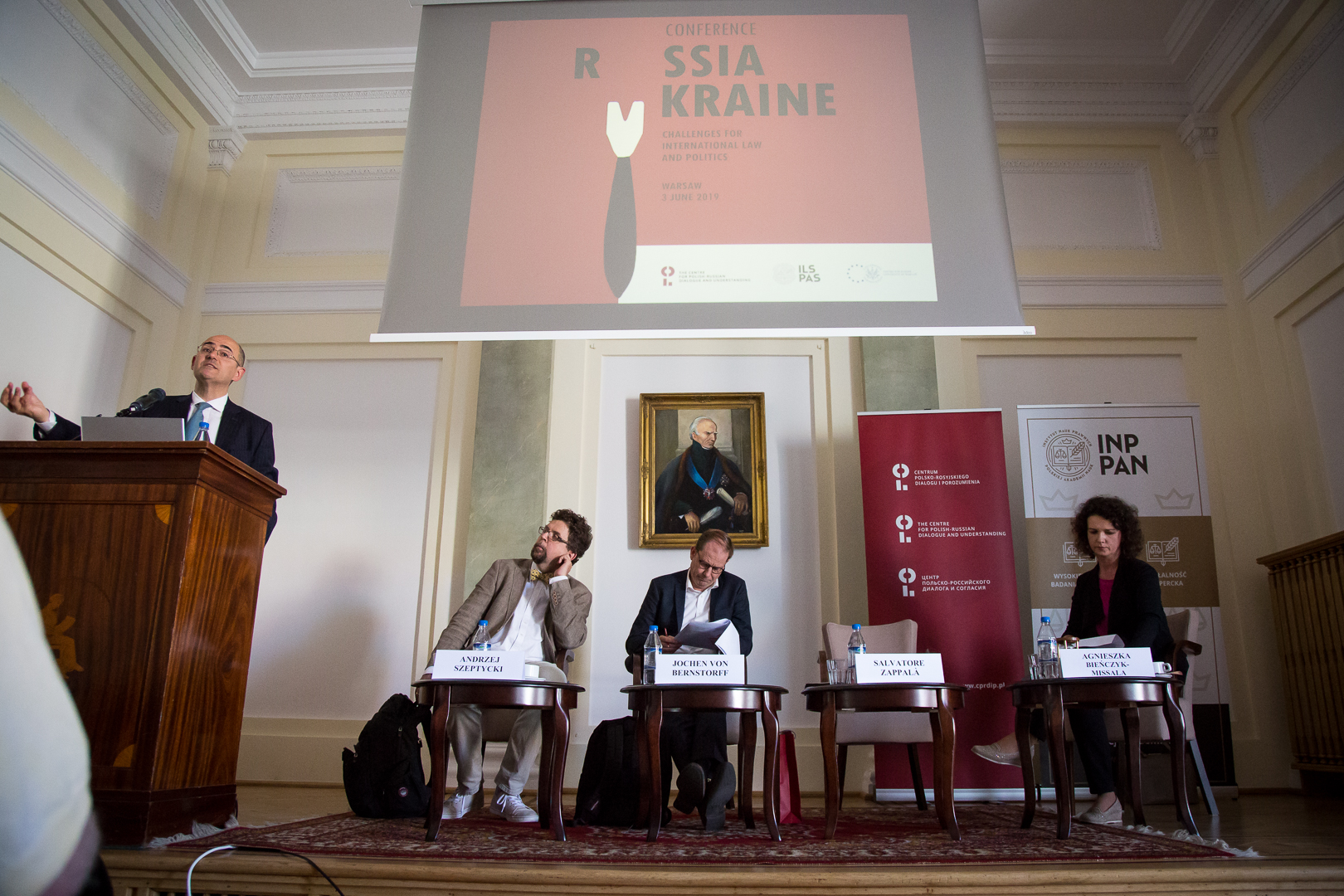"Russia and Ukraine: Challenges for International Law and Politics
The Centre for Polish-Russian Dialogue and Understanding in cooperation with the Institute of Legal Sciences of the Polish Academy of Sciences and the European Centre of the University of Warsaw organized an international scientific conference – Russia and Ukraine: Challenges for International Law and Politics. The conference was attended by political scientists and lawyers from Russia, Ukraine, and other European countries.
Five years after the annexation of Crimea, Russian-Ukrainian relations are still very unstable, which results in multiple issues in international arena. The exacerbated situation in eastern Ukraine and the incidents in the Sea of Azov make the Russian-Ukrainian conflict one of the most important challenges for international politics and international law. The first panel of the conference was devoted to the analysis of the current situation from the point of view of international law. The experts tried to present possible scenarios for getting out of the impasse. The second session analysed the possibilities of international institutions to help stabilize the situation on the spot. The last panel was devoted to the political perspective. The scenarios feasible under international law have been verified against the interests of the individual players.
The discussion was inspired by the book The Case of Crimea's Annexation under International Law, published by the Centre and Scholar Academic Publishing House.
We invite you to have a look at the conference program:
10:00-10:10 Opening:
- Ernest Wyciszkiewicz (Centre for Polish-Russian Dialogue and Understanding, Warsaw)
- Bogdan Góralczyk (Centre of Europe of Warsaw University)
- Władysław Czapliński (Institute of Law Studies of the Polish Academy of Sciences, Warsaw)
10:10-11:40 Session 1: Crimea and Donbas under legal scrutiny - where are we and where can we go from here?
Moderator: Łukasz Adamski (Centre for Polish-Russian Dialogue and Understanding, Warsaw)
- Dagmar Richter (Saarland University, Saarbrücken) – U.N. Resolutions and Declarations Relating to the Donbas Region
- Władysław Czapliński (Institute of Law Studies of the Polish Academy of Sciences, Warsaw) – Emerging and Unrecognized Entities in International Law
- Nikolay Marin (South-West University “Neofit Rilski”, Blagoevgrad) – How to regulate the situation of Crimea (from the point of view of international law), probable and less probable scenarios, taking into account the jurisdiction of adequate international courts and tribunals
- Hennadiy Maksak (Foreign Policy Council “Ukrainian Prism”, Kyiv) – Political and legal peculiarities of the current situation in Crimea and Donbas, likely and unlikely scenarios of developments between Russia and Ukraine
11:40-12:00 coffee break
12:00-13:30 Session 2: Norm-makers, norm-setters, norm-enforcers? Real and imagined capabilities of international institutions
Moderator: Agnieszka Bieńczyk-Missala (Warsaw University)
- Salvatore Zappalà (University of Catania) – What can be done in the case of the Ukrainian-Russian conflict on the UN level?
- Jochen von Bernstorff (Tübingen Law Faculty) – The erosion of the prohibition of the use of force in international law: From Crimea to Yemen
- Andrzej Szeptycki (Warsaw University) – The future of Ukraine-Russia relations from the perspective of EU actors
13:30-14:15 lunch
14:15-15:45 Session 3: A political reality check – who is ready, willing and able to do what, when and under what conditions?
Having in mind possible legal solutions as given during the proceeding, which of them are or can be politically feasible under what conditions now or in the future given different domestic contexts and foreign policy agendas of each stakeholder (Russia, Ukraine, Poland, NATO, EU).
Moderator: Ernest Wyciszkiewicz (Centre for Polish-Russian Dialogue and Understanding, Warsaw)
- Andrey Zagorskiy (Primakov Institute of Word Economy and International Relations (IMEMO) of the Russian Academy of Sciences, Moscow)
- Olena Snihyr (Diplomatic Academy of Ukraine at the Ministry of Foreign Affairs of Ukraine, Kyiv)
- Łukasz Kulesa (Polish Institute of International Affairs, Warsaw)
15:45-16:00 Final remarks
